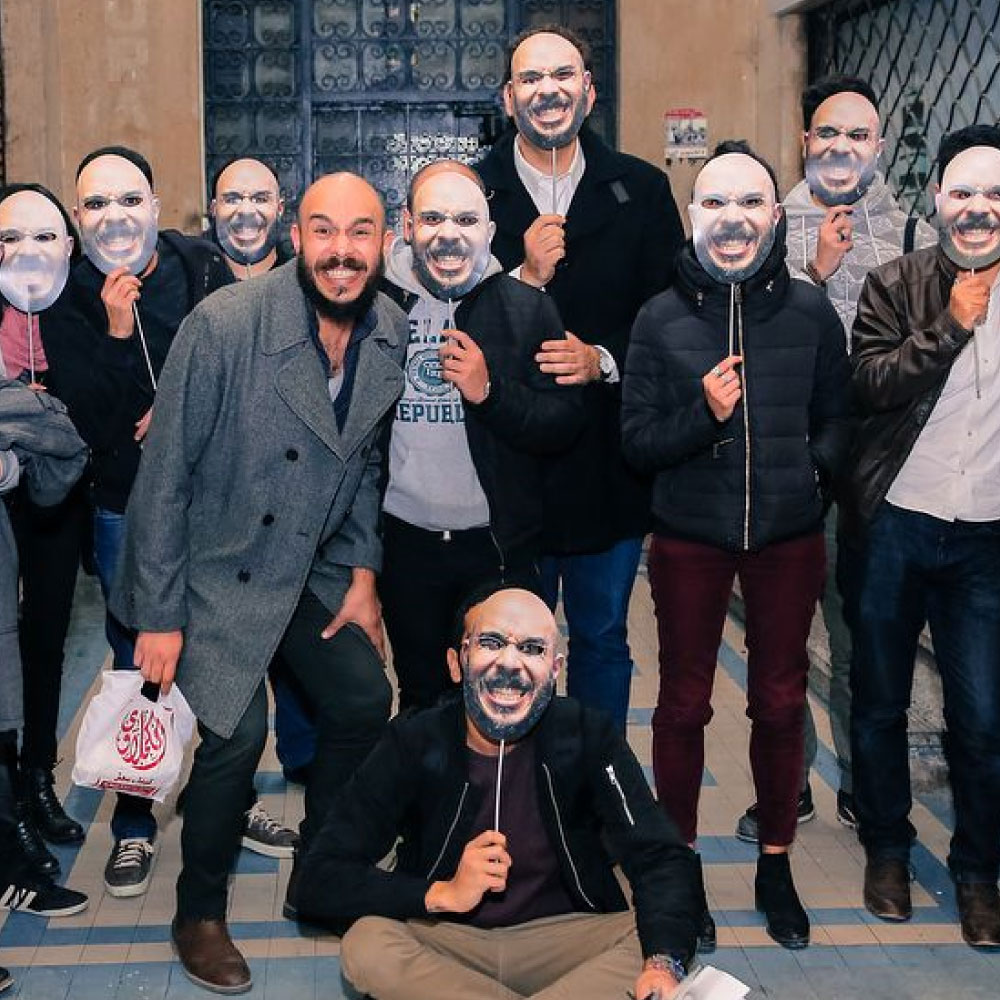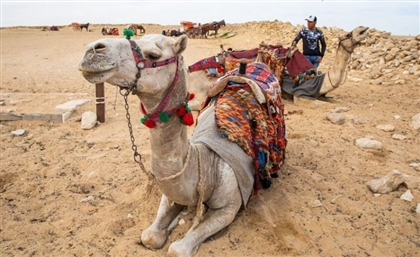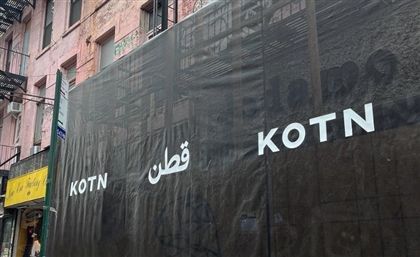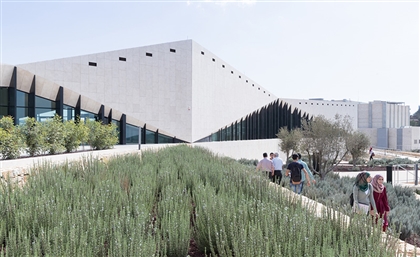Seeking Seclusion at Al Tarfa Lodge & Egypt's Unspoiled Western Front
Editorial Director, Haisam Awad, steps out of his comfort zone and away from the concrete chaos of Cairo, to wrestle with the peace and quiet of one of Egypt's most unique lodges.
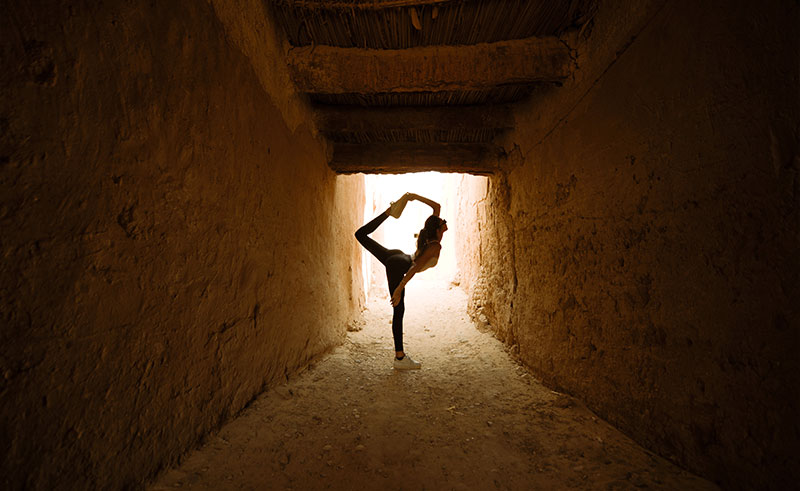
I don’t get it. I mean, I do get it, on an intellectual level. I understand modern man’s growing obsession with seclusion and isolation. To me, though, silence is terrifying. To me, I was the wrong person to go to the far reaches of Egypt’s Western Desert to write an article about Al Tarfa, a lodge and self-proclaimed ‘desert sanctuary’ in New Valley’s Dakhla, one of several oases in the gigantic governorate. I certainly wasn’t the person to invite to mark the opening of a new ‘shala’ at the lodge, a sacred place of holistic healing, a sanctuary for yogis and specialists of other adjacent practices.
I told myself to look past the almost 800 km trip I was about to take, to think of this not as an assignment, but as an opportunity. I told myself that, at the age of 36, my window for ‘trying new things’ and ‘stepping out of my comfort zone’ is closing more and more with every passing year. Maybe I’d have an epiphany of somesort. Maybe I’d return to the chaos of Cairo, hand in my article and turn my back on life as I know it in pursuit of a purer existence.
One charter flight and a three-hour road trip later, I was still repeating these prophetic affirmations to myself. It was a Thursday, by far the busiest day of my working week. I wondered what the 4G signal would be like. I looked at the schedule for the thoroughly curated trip, one filled with a whole weekend of activities, to try and pick out when the best times to get some work done would be. I even wondered whether I’d brought the right footwear. I was thinking about all the wrong things. I’d brought the chaos with me, all 800 km of the way.
Meanwhile, my travel companions - all of whom were yoga teachers, owners of studios specialising in alternative healing practices of all kinds - giddily chatted about the new shala. Some had held retreats at Al Tarfa for their students and were familiar with the intangible magic that I’d heard and read so much about. They were friendly and amiable amongst each other, despite being strangers. As we drove through the desert from an airport located in Kharga, 250-plus km away from our final destination, I wondered how I might be able to break into their quickly forming circle.
What I quickly realised upon arrival is that I needed to be more like Wael Abed, the hands-on owner that helped bring Al Tarfa to life, the man who almost single-handedly maintains it, supported by the lodge’s staff.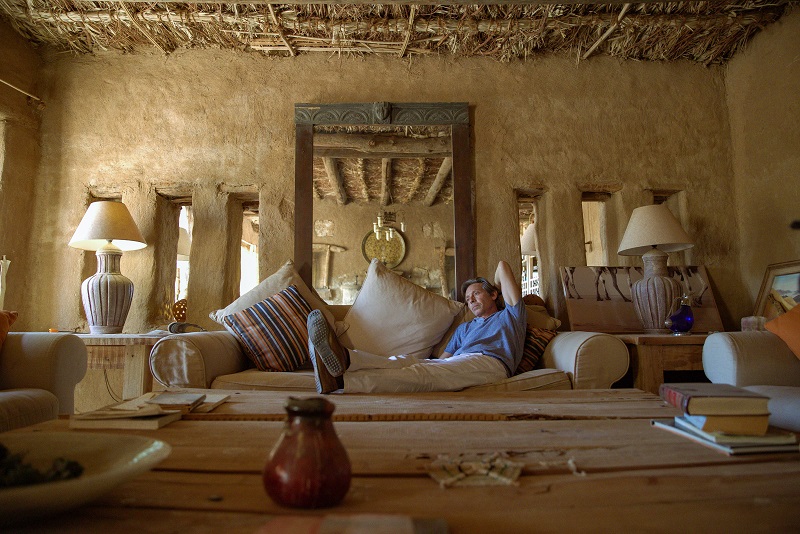 An avid desert explorer, Abed is a modern frontiersman, a gentleman cowboy who has parlayed with politicians and influential men. He’s a leisured fellow with a common touch, a man whose refined tastes don’t get in the way of his rough-and-tumble spirit. He talks freely and reports happily of the challenges he’s faced, the many hurdles that have been thrown in front of him in essentially producing something out of nothing in the vast expanse of Egypt’s largest governorate, with little exasperation. When I ask him why he perseveres, how he brings himself to march on, he explains that he thinks of himself as an ambassador for Dakhla and its surrounding settlements. He’s a sheriff in an unruly land. He fights for Dakhla and the vision he’s brought to life, a vision that has been recognised by everyone from CondéNast Traveller and Harper’s Bazaar, to Tatler and even the The Financial Times, all hailing it for the utterly unique and inimitable escape it offers.
An avid desert explorer, Abed is a modern frontiersman, a gentleman cowboy who has parlayed with politicians and influential men. He’s a leisured fellow with a common touch, a man whose refined tastes don’t get in the way of his rough-and-tumble spirit. He talks freely and reports happily of the challenges he’s faced, the many hurdles that have been thrown in front of him in essentially producing something out of nothing in the vast expanse of Egypt’s largest governorate, with little exasperation. When I ask him why he perseveres, how he brings himself to march on, he explains that he thinks of himself as an ambassador for Dakhla and its surrounding settlements. He’s a sheriff in an unruly land. He fights for Dakhla and the vision he’s brought to life, a vision that has been recognised by everyone from CondéNast Traveller and Harper’s Bazaar, to Tatler and even the The Financial Times, all hailing it for the utterly unique and inimitable escape it offers.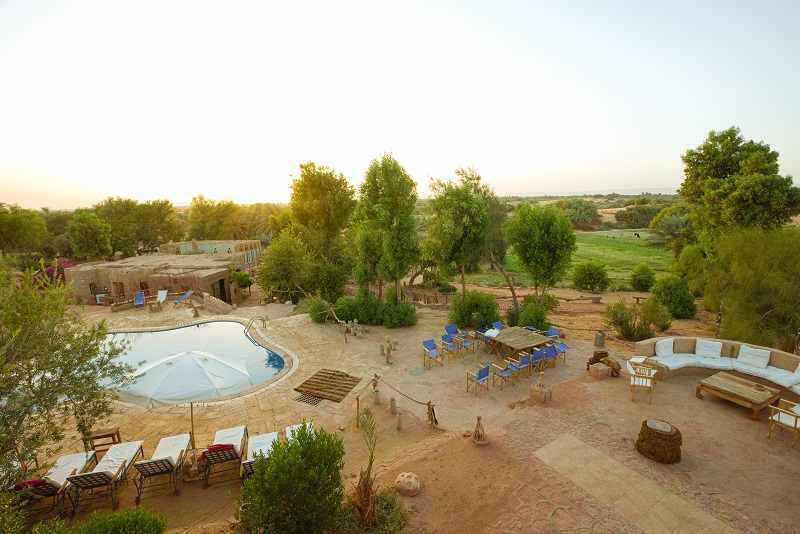 These aren’t empty words. Al Tarfa is built of its surrounding lands’ materials and traditions - something that struck me as our bus rolled through the gates of Al Tarfa’s grounds. It doesn’t disrupt the landscape, it comes as a seemingly natural extension of it.
These aren’t empty words. Al Tarfa is built of its surrounding lands’ materials and traditions - something that struck me as our bus rolled through the gates of Al Tarfa’s grounds. It doesn’t disrupt the landscape, it comes as a seemingly natural extension of it.
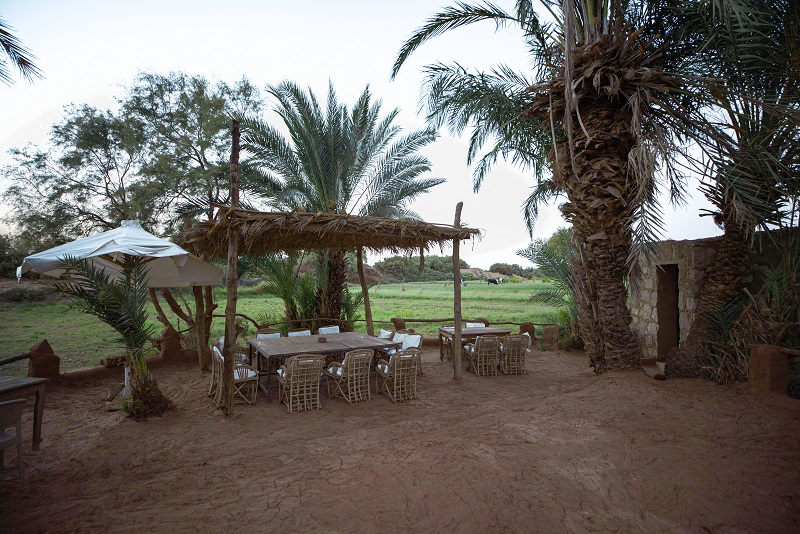 There are no perimeter fences - you're just surrounded by a seemingly endless landscape. Trees cascade over the grounds, which are dotted with rooms and other one-floor, hut-like buildings. The 20 rooms and suites vary in sizes, but an almost primitive construction inspired by local villages and a simple, unfussy interior ties them - and a reception area, a restaurant and a handful of other mixed-use spaces - together to form the scattered structures into a small village or town in itself. Meals are made from the fat of the land, the kitchen lives on the produce of local farmers.
There are no perimeter fences - you're just surrounded by a seemingly endless landscape. Trees cascade over the grounds, which are dotted with rooms and other one-floor, hut-like buildings. The 20 rooms and suites vary in sizes, but an almost primitive construction inspired by local villages and a simple, unfussy interior ties them - and a reception area, a restaurant and a handful of other mixed-use spaces - together to form the scattered structures into a small village or town in itself. Meals are made from the fat of the land, the kitchen lives on the produce of local farmers.
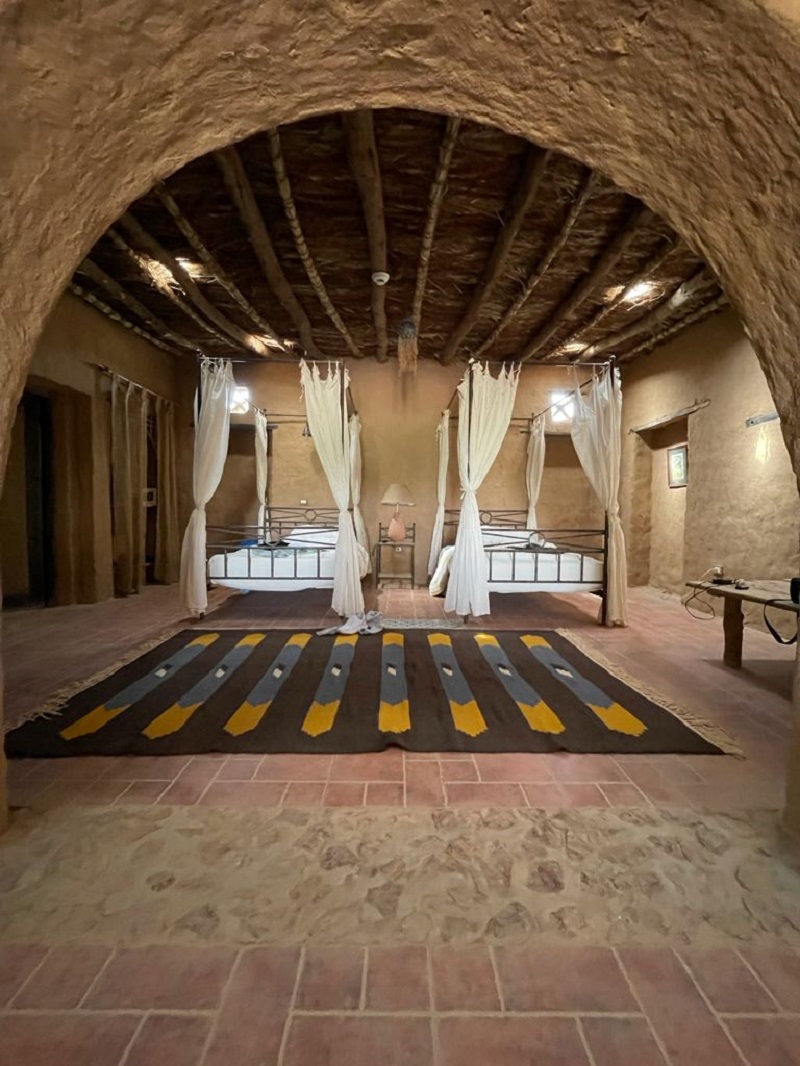 Palm leaves are interwoven and cover the ceilings, leaving small windows to let in the light. Like one might assume of a lodge, wood is the dominant material of the interiors. There are no TVs, no phones, the only familiar elements of a hotel room stopping at a safe box and an air conditioning unit. Ultimately, though, Al Tarfa isn’t a place to seclude yourself in a room. The common spaces invite stayers to mingle and assimilate with each other.
Palm leaves are interwoven and cover the ceilings, leaving small windows to let in the light. Like one might assume of a lodge, wood is the dominant material of the interiors. There are no TVs, no phones, the only familiar elements of a hotel room stopping at a safe box and an air conditioning unit. Ultimately, though, Al Tarfa isn’t a place to seclude yourself in a room. The common spaces invite stayers to mingle and assimilate with each other.
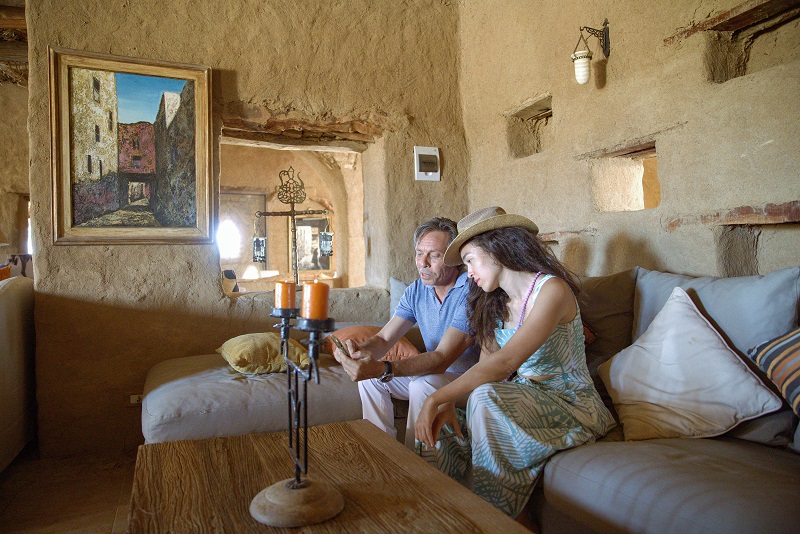 For me, this all provided a reminder that I wasn’t just here to see Al Tarfa, I was here to experience everything I couldn’t see, everything I couldn’t comprehend. I was here for the shala and the first stop was an early evening opening ceremony - and I dared not ask what it would entail.
For me, this all provided a reminder that I wasn’t just here to see Al Tarfa, I was here to experience everything I couldn’t see, everything I couldn’t comprehend. I was here for the shala and the first stop was an early evening opening ceremony - and I dared not ask what it would entail.
The ceremony had us sit in a circle at the centre of the shala. It didn’t take long for my knees to start aching. I hadn’t sat on the floor for this long in some time. I watched how the others were sitting, as I fidgeted and changed positions more times than I can remember. Each guest took turns to introduce themselves, offering a small window onto their inspiring journeys. It was then that I felt small, an abstraction of a human being, not fully formed. I was weary of the others noticing my cold gaze, as they recounted leaving their careers in search of something more meaningful.
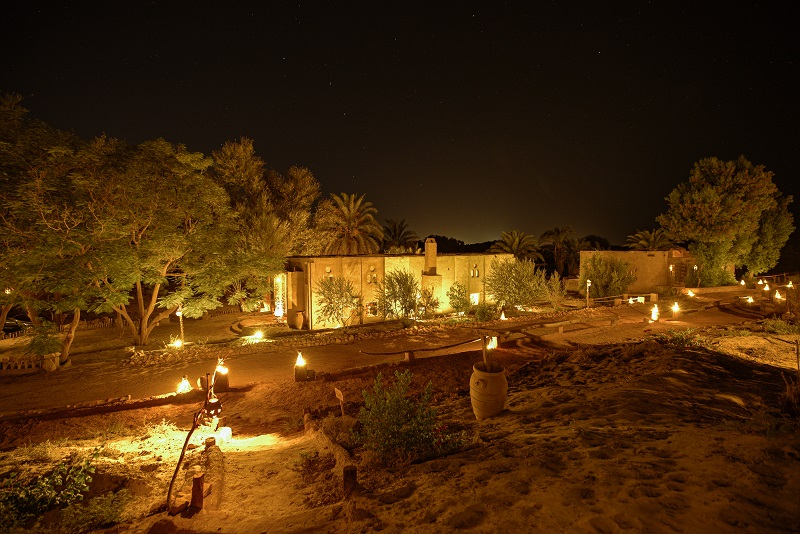 Cherine Samir, founder of Zamalek-based studio, NINE Healing Vibes, worked in development for years, at the International Finance Corporation, no less. She left behind the bureaucracy and what she saw as an ineffective organisation, mutton dressed as lamb if you will, for the world of sound healing. It was just one of several similar stories that made me feel like a disruption in the serenity of the shala. The various elements that make up my daily life seemed insignificant, unimportant, useless tender in a world defined by composure and self-assuredness. It was only upon this sobering reality check that I began to look around me at the shala. It's ultimately a simple place, but by accident or by design, it ticks all the boxes, despite Abed admitting that this is a new world to him. It’s airy but inviting, open but cosy, the sunlight dashing through its windows throughout the day.
Cherine Samir, founder of Zamalek-based studio, NINE Healing Vibes, worked in development for years, at the International Finance Corporation, no less. She left behind the bureaucracy and what she saw as an ineffective organisation, mutton dressed as lamb if you will, for the world of sound healing. It was just one of several similar stories that made me feel like a disruption in the serenity of the shala. The various elements that make up my daily life seemed insignificant, unimportant, useless tender in a world defined by composure and self-assuredness. It was only upon this sobering reality check that I began to look around me at the shala. It's ultimately a simple place, but by accident or by design, it ticks all the boxes, despite Abed admitting that this is a new world to him. It’s airy but inviting, open but cosy, the sunlight dashing through its windows throughout the day.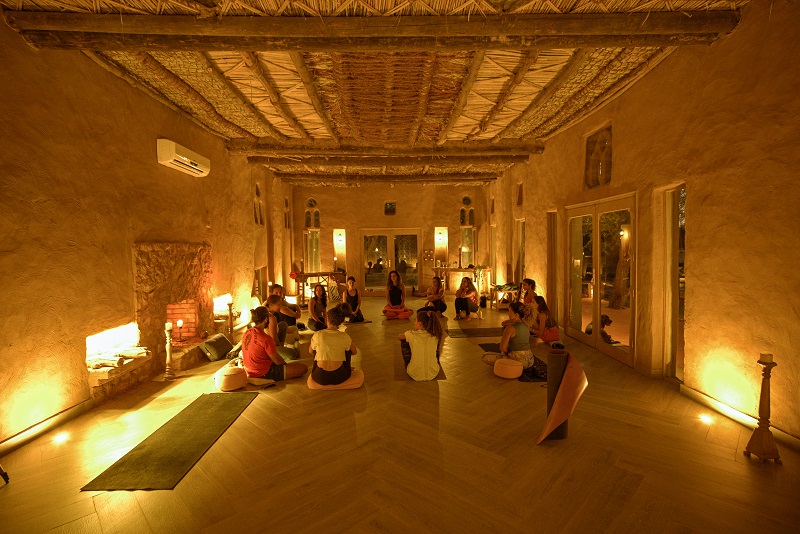 When it was my turn to introduce myself, Wael gave me the grandest of prefaces, a fantastical foreword that I could possibly never live up to - he positioned me as the man who holds one of the keys to telling the story of Al Tarfa, the story of Dakhla, the story of one of Egypt’s most unique natural beauties, a place that subsequently positioned me as the antithesis of what Al Tarfa stands for. These guys aren’t going to be impressed with me, they won’t see any value in why I’m here. I’m an outsider, a fabrication drawn from a million-and-one cliches - the opposite of Abed and his guests. My introduction was almost apologetic, a disclaimer that I’d be buzzing around like an incessant mosquito, observing and surveying with little-to-no real understanding of what Al Tarfa represents, what it offers to my new pals.
When it was my turn to introduce myself, Wael gave me the grandest of prefaces, a fantastical foreword that I could possibly never live up to - he positioned me as the man who holds one of the keys to telling the story of Al Tarfa, the story of Dakhla, the story of one of Egypt’s most unique natural beauties, a place that subsequently positioned me as the antithesis of what Al Tarfa stands for. These guys aren’t going to be impressed with me, they won’t see any value in why I’m here. I’m an outsider, a fabrication drawn from a million-and-one cliches - the opposite of Abed and his guests. My introduction was almost apologetic, a disclaimer that I’d be buzzing around like an incessant mosquito, observing and surveying with little-to-no real understanding of what Al Tarfa represents, what it offers to my new pals.
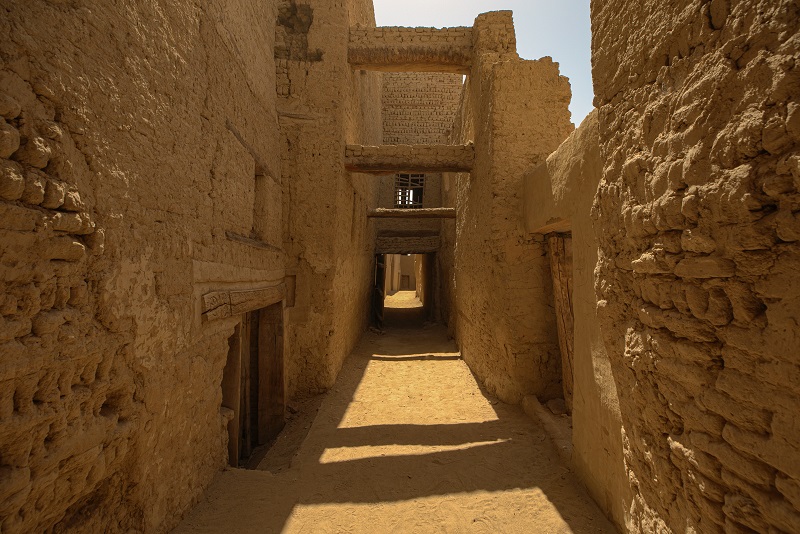
What it offers is an escape in the realest of senses, a simultaneous feeling of nothing and everything that strikes when you look out into the wide open spaces that surround Al Tarfa. Dakhla is also home to some quite unique antiquities sites. Al Qasr is a nearby 10th century medieval town made of mud-brick. It’s all connected, the homes, the mosque, the winding alleyways and small doorways that invite you to explore and get lost in an unintended labyrinth. The deeper you go down the rabbit hole, the more surreal it gets, as you discover even smaller, winding alleys. Abed strolled around like this was his stomping ground, casually greeting the handful of locals around and reporting happily on his yoga-loving charges, as they flips, twist and bend in various pockets of this almost singular structure. The peak is climbing the highest point, one that overlooks the whole area. We see another lodge sitting atop a hill, treetops as far as the eyes can see, eventually mixed with residential buildings, but all in harmony, all in a kind of organic sequence.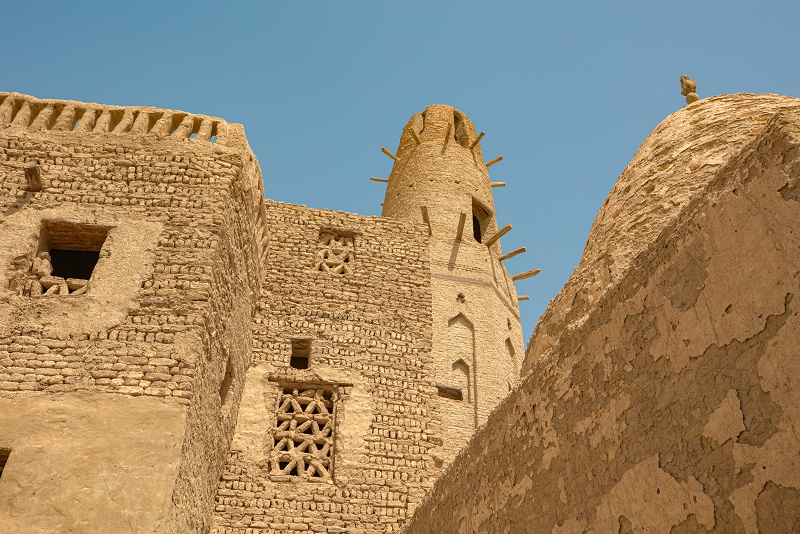 For our second off-ground excursion, we were taken to a nearby dunes park, where we climbed the steepest dune I’ve ever come across. The sand drags with every step, but it was certainly worth the minor inconvenience. Reaching the top, I saw the same thing I would look out of Al Tarfa into its surroundings: nothing and everything.
For our second off-ground excursion, we were taken to a nearby dunes park, where we climbed the steepest dune I’ve ever come across. The sand drags with every step, but it was certainly worth the minor inconvenience. Reaching the top, I saw the same thing I would look out of Al Tarfa into its surroundings: nothing and everything.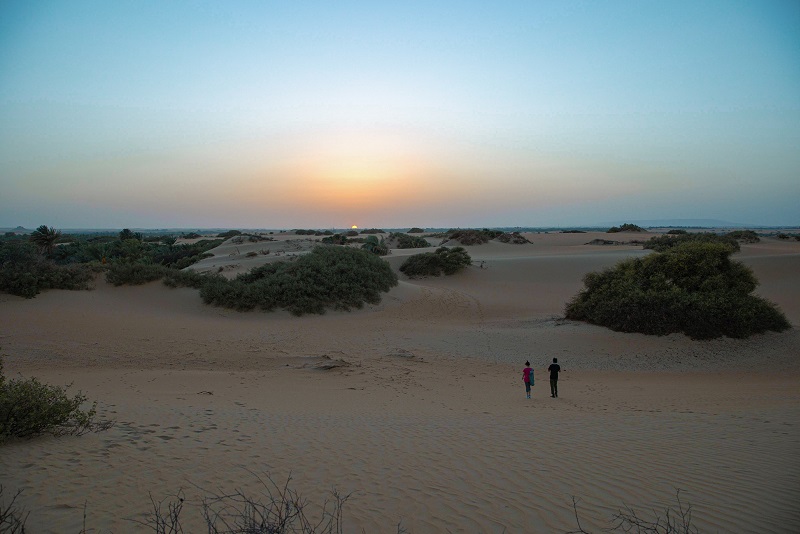
Our last dinner was the most spectacular and it had nothing to do with what was served. Behind the pool area, sunken down, hiding below is a charming little barbecue area, lined with two long, low tables and anchored by a large fire pit in the middle. By the time I had arrived, the fire was dancing, jolting wildly in the wind. Abed sat, drink in hand, staring into the orange waves. He’d decided to wear his horse-riding boots that evening and though I’m almost certain he hadn’t just dismounted one, it worked. It just worked with the whole mise en scene of our final hurrah. Dishes came and went and the wine flowed, as the guests took stock of their adventures, sharing anecdotes and inviting each other to their respective studios back at home in Cairo. Buoyed by the new shala, they think-out-loud about the retreats they plan to bring their students on in Al Tarfa. For them, the shala was the last piece of the puzzle. Al Tarfa had transcended its own idyllicism, its self-perpetuating position as the escape of all escapes. It had entered into their world, opened its arms to them in a way it never had - a sentiment that transcended the physical structure of the shala.
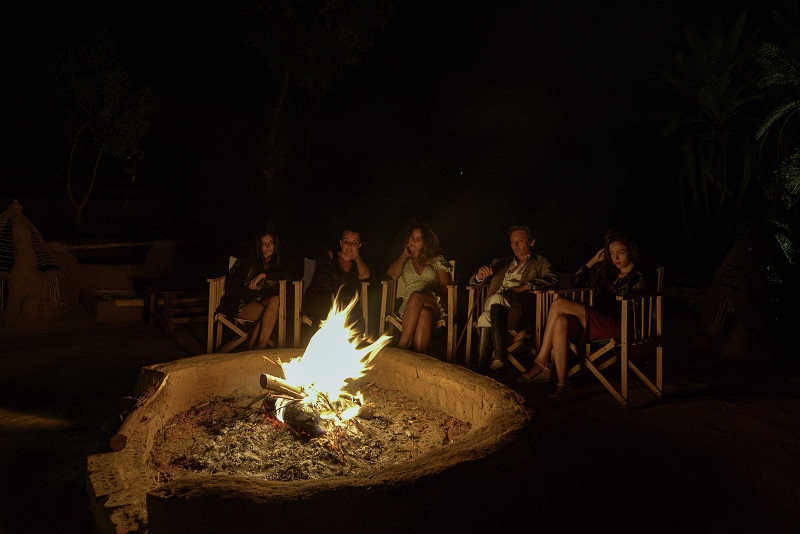 Al Tarfa seems to build communities. There’s a refreshing informality in dealing with the staff, who don’t wear uniforms, who aren’t burdened by the prim-and-stiff conventions of modern hotels and retreats. It all feeds into the organic flow of Al Tarfa. It’s informal paths invite you to saunter around with no end destination.
Al Tarfa seems to build communities. There’s a refreshing informality in dealing with the staff, who don’t wear uniforms, who aren’t burdened by the prim-and-stiff conventions of modern hotels and retreats. It all feeds into the organic flow of Al Tarfa. It’s informal paths invite you to saunter around with no end destination.
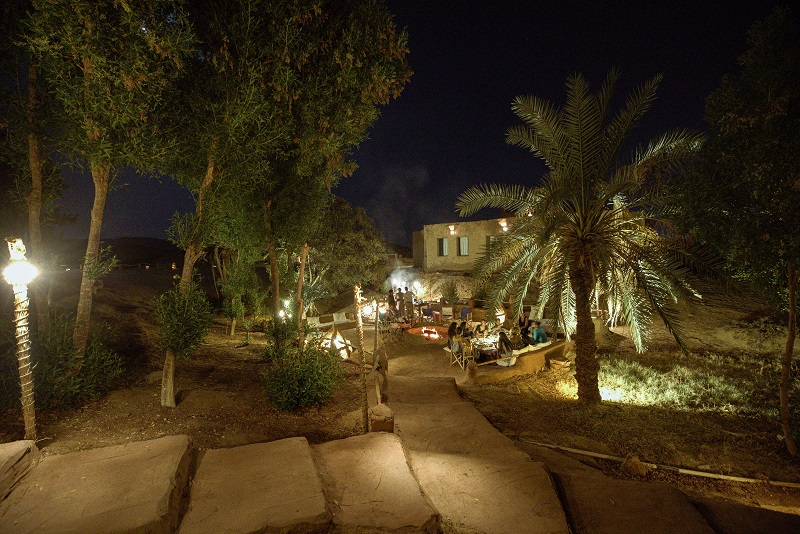
And that’s what it all boils down to, it’s what I ‘learned’. Al Tarfa affords the human psyche freedom and, in my case, maybe that was more freedom than I could handle.
For me, it’s too late. I’m too far gone. My feet were planted in the concrete long ago and, with every passing year, the dirt and the dust, the stress and the sweat, grow stronger in their clasp. By my estimation, it’s probably reached just above my hips - so maybe there’s still hope. I only feel a little sorry for myself, though. I’ve given up and accepted my fate, and I say this with the same cold gaze that came over me in the shala.
I get it a little bit more, now - the seclusion, the isolation. I will go back to Al Tarfa one day, without an assignment, without a laptop, without an intention. Until then, though, I’ll disappear back into the chaos.
Photos by Mahmoud Saleh for MO4 Network
- Previous Article Dr.Sisilove or How (Not) To Diffuse A Bomb
- Next Article Kids of Birdrock Orphanage Present A Christmas Carol in Downtown Cairo
Trending This Week
-
Apr 23, 2024
-
Apr 18, 2024



